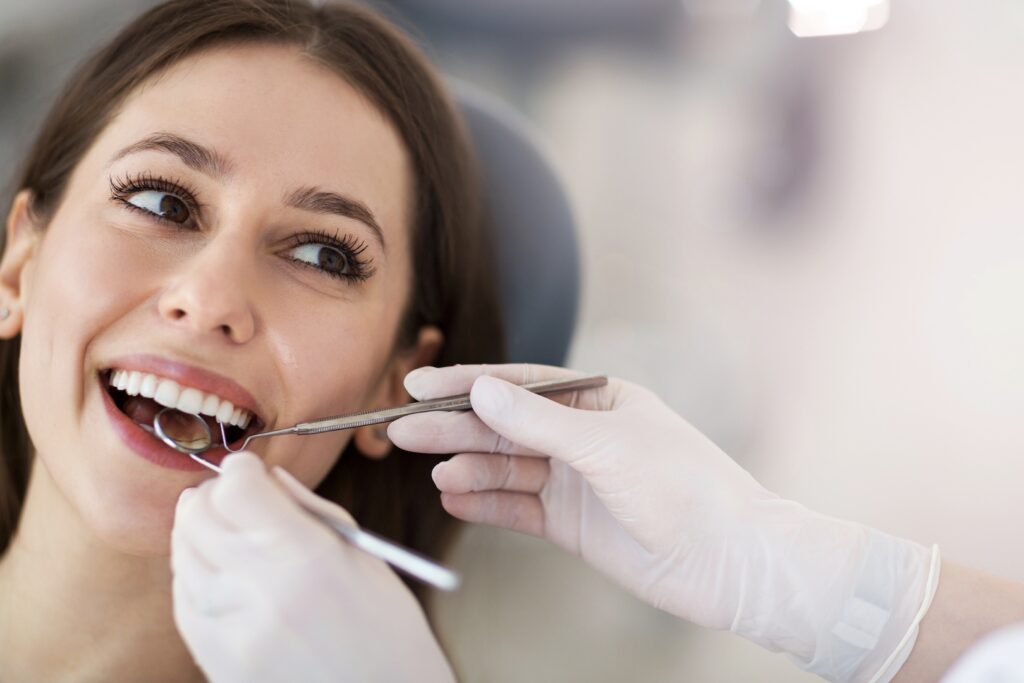

A dental cleaning does more than keep your smile looking bright; it also safeguards your overall oral health and even your wallet from costly procedures later on.
Before you schedule your next appointment, there are key factors you should consider, from what your insurance covers to what you actually need for your specific situation. So stick around cause you’re about to learn everything there is to know about dental cleanings.

Mother - General Dentist - Blogger
A dental cleaning is a professional procedure that involves a deep clean that targets plaque, tartar, and stains on your teeth, which brushing and flossing at home can’t fully address. You might be surprised at how detailed this process is to maintain your oral hygiene.
Typically, a dental hygienist will start with a physical exam of your entire mouth. They look for signs of trouble like inflamed gums or other issues that might need attention. Then, using specialized tools, they remove plaque and tartar buildup from your teeth, especially around the gum line and in between teeth.
After the tartar is removed, they’ll use a high-powered electric toothbrush and a gritty toothpaste to clean your teeth more thoroughly. Finally, they might apply a fluoride treatment to help protect your teeth against cavities until your next visit. Regular cleanings are crucial for not just a healthy smile, but for preventing more serious dental problems down the road.
A dental cleaning might cost you anywhere from $75 to $200 without dental insurance, and that can vary quite a bit depending on things like location, the dentist’s experience, and the office’s pricing structure. Always, always ask your dental office for a quote ahead of time. Compare prices if needed, but prioritize quality and comfort over just finding the cheapest option. Trust me, your oral health is worth it!
However, If you’re insured, it’s often fully or substantially covered by your dental plan. Check your policy benefits chart for the specifics of what’s included. If you are looking for a Dental Insurance plan with coverage for dental cleanings call SHD Insurance now at (866) 664-0276 and get a free Quote!
First, there’s an initial examination. Your dental hygienist will check your mouth, teeth, and gums to assess overall oral health.
Next comes the removal of plaque and tartar. Using a small mirror, the hygienist guides a scaler around your teeth to eliminate these hardened deposits, mainly focusing on areas that are harder to brush or floss yourself.
After the scaling, the dental cleaning continues with polishing. The hygienist will use a high-powered electric brush and gritty toothpaste to scrub your teeth. This helps to remove surface stains, making your smile brighter.
Finally, you’ll get a professional flossing. This step ensures that any remaining debris is removed from between your teeth. The hygienist will also offer you tips on how to maintain proper oral hygiene at home, based on what they observed during the cleaning.
Generally speaking, most dentists recommend getting a dental cleaning twice a year. This standard guideline helps maintain optimal oral health. However, it’s not a one-size-fits-all recommendation. Depending on your specific oral health situation, your dentist might suggest more frequent cleanings.
For instance, people with gum disease or other dental issues may need quarterly cleanings. On the flip side, some individuals with exceptional oral hygiene and no history of dental problems might only need an annual cleaning.
Ultimately, the best frequency for dental cleanings will vary based on your unique dental health needs, so having a conversation with your dentist is crucial. Regular check-ups ensure that any adjustments to your cleaning schedule are tailored just for you.
Call us now and get a free quote. Plans starting as low as around $1/day.

You might be wondering how long you’ll be in that chair. Typically, a standard dental cleaning can take anywhere from 30 minutes to an hour, but it can vary based on your individual dental health.
If it’s been a while since your last cleaning, or if you have significant tartar buildup, expect to be there for the full hour. Keep in mind that this timeframe can extend if additional procedures are needed, such as X-rays or assessments for gum disease.
Dental cleanings offer numerous benefits, including the removal of plaque, tartar, and surface stains. These cleanings help prevent gum disease, cavities, and other oral health issues, such as tooth loss and even oral cancer; ensuring your smile remains healthy and bright.
However, it’s important to be aware of potential risks, such as “cleaning shock.” This occurs when plaque is removed too quickly, resulting in temporary tooth sensitivity. On rare occasions, deep dental cleanings can expose untreated tooth decay, requiring further dental care. Despite these risks, the benefits generally outweigh the downsides, making routine cleanings a vital part of oral hygiene.
Regular dental cleanings can help reduce the risk of heart disease by improving overall oral health. Besides health benefits, cleanings can also leave you with teeth that are visibly cleaner, whiter, and more radiant. This contributes to fresher breath and a brighter smile, making you confident in social and professional settings.
Routine dental cleanings also enable your dentist to catch potential issues early. Identifying cavities or signs of gum disease before they become serious can save both your teeth and your wallet in the long run.
While dental cleanings are generally safe, they carry some potential risks one should be aware of.
Tooth Sensitivity: After a cleaning, your teeth might feel more sensitive to hot and cold foods or drinks.
Gum Bleeding: It’s not uncommon for gums to bleed slightly during and after a dental cleaning, especially if you have gum disease.
Infection: Though rare, there’s a small risk of infection, particularly if you have compromised immunity.
Enamel Damage: Aggressive cleaning can sometimes wear down enamel, especially if done improperly.
Most of these risks are minimal and can be managed with proper post-cleaning care. Always inform your dentist about any health conditions or concerns you have before the dental cleaning procedure. Discuss any post-cleaning discomfort with your dentist to ensure it’s managed effectively.
Well there you have it. Dentures will definitely improve your quality of life, but once you get them you must take the time to maintain them. By investing in quality products and following proper cleaning routines, you’ll ensure their longevity. Regular dental check-ups are equally important for fit adjustments and oral health.
If you are struggling to find a good dental plan that you can rely on when needed; SHD offers great options for individuals, families and seniors. Call us now at (866) 664-0276 to get a free Quote!
By clicking the “Get a Quote Now” button above, I expressly authorize SHD, Smart Health Dental, LLC along with their agents and affiliates, to call me or send me recorded messages or texts about their Dental Insurance Plans, products and services using automated technology to the telephone/cellular number I entered immediately above, which I certify is my own number. I understand that I am not required to consent in order to make a purchase.
Plans powered by Renaissance Dental
Looking for a Dental Plan?
We offer insurance and non-insurance plan options designed to fit your needs and budget